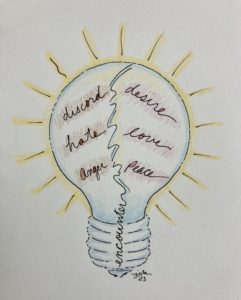
-Illustration © 2023 Jan Ketchel
In 1966, Puerto Rican psychiatrist Efren Ramirez, my first therapist and mentor, captured the heart and imagination of New York City when he introduced his singularly unique treatment approach, based on existential principles, as a method to tackle the drug addiction problem ravaging the city.
The fabled success of his addiction treatment programs in Puerto Rico prompted Mayor John Lindsay to offer him carte blanche support to replicate this success in New York. As a result, Therapeutic Community treatment programs (TCs) soon sprang up throughout the five boroughs of New York City.
Efren’s treatment approach, called The Concept, utilized existential encounter to awaken, within the addict, knowledge of the absolute power of their choices in determining their reality.
Rollo May, noted existential psychiatrist and author, pointed out that, for Ramirez, emphasis on diagnosis, etiology and prognosis actually obstructs and weakens the patient’s ability to gain full access to, and assume responsibility for, the central power of choice in determining the outcome of their lives. (Existential Psychology, 1969 edition)
The ability to assume full responsibility for one’s choices requires existential confrontation with one’s behaviors and attitudes, which brings to consciousness the choices one is already making, though largely at an unconscious level.
Through the enlightenment gained by one’s encounter with the feedback received from others, one becomes fully aware of how one blindly exercises one’s free will in one’s attitudes and behaviors. With this heightened awareness, one’s free will can be more judiciously exercised to the benefit of one’s life.
A generation before, from the heart of the holocaust, existential psychiatrist Victor Frankl observed and experienced that the single most important variable that determined whether one would survive or die in a death camp was the attitude one chose to assume while interned in the most terrifying, horrific and dehumanizing conditions imaginable.
The exercise of will to choose a positive attitude in the midst of a death camp could literally save one’s life. Furthermore, no one and nothing could take away an individual’s free exercise of imagination and will.
Carolyn Elliot, in her recent book, Existential Kink, takes one down the rabbit hole of one’s inner shadow to discover, own, and radically accept one’s unconscious yet willful collusion with the consciously rejected behaviors and habits active in the hidden recesses of one’s shadow.
Elliot stresses that “having is wanting” and that one must accept this in order to encourage one’s existential encounter with the many shades of will active in one’s being. This fuller acceptance of the polarities within the self frees the will to make choices that accommodate the wholeness of self.
The shamans of ancient Mexico sought to galvanize the will to be fully, mindfully present each day by shocking the ego with an existential encounter with death as an advisor.
Stating, each morning, “I am a being who is going to die” awakens the will to a heightened level of unified presence in each moment, as it chooses its attitudes and behaviors throughout the day. This intent of the will treats each moment with an equanimity that is fully prepared to seamlessly transition from this life in full consciousness as well.
Will is the creator of personal reality. Existential encounter with the fullness of self frees the will to responsibly exercise its power from the vantage point of total presence in the current moment. The intent of the will is then materialized through the suggestions one delivers to the subconscious mind.
The subconscious mind is the Mother of creation.
The subconscious mind stores the journey of the soul through all of its history.
The subconscious mind has total control over the functioning, sensations and health of the body.
The subconscious mind is the home of the instincts.
The subconscious mind has the knowhow and materials to manifest anything suggested to it.
As powerful as the subconscious is, it is still pure Yin. Yin is completely receptive, the feminine principle/anima, and capable of creating anything, but requires a suggestion to begin operations. Yang, her partner, the masculine principle/animus, is the Will.
Will is the active side of infinity, whose task it is to activate his partner’s creative process via suggestion. With their creative energies in sync, anything is possible. Every one of us is a combination of this divine couple and have the ability to both activate and create.
With consciousness raised through existential encounter, the will is freed to truly transcend the self-deceptive suggestions often made to the subconscious mind that keep one frozen in habitual disappointment.
Will, freed to suggest to the subconscious full healing of self and world, is indeed the necessary and adventurous order of our day.
Heal the self, heal the world,
Chuck
